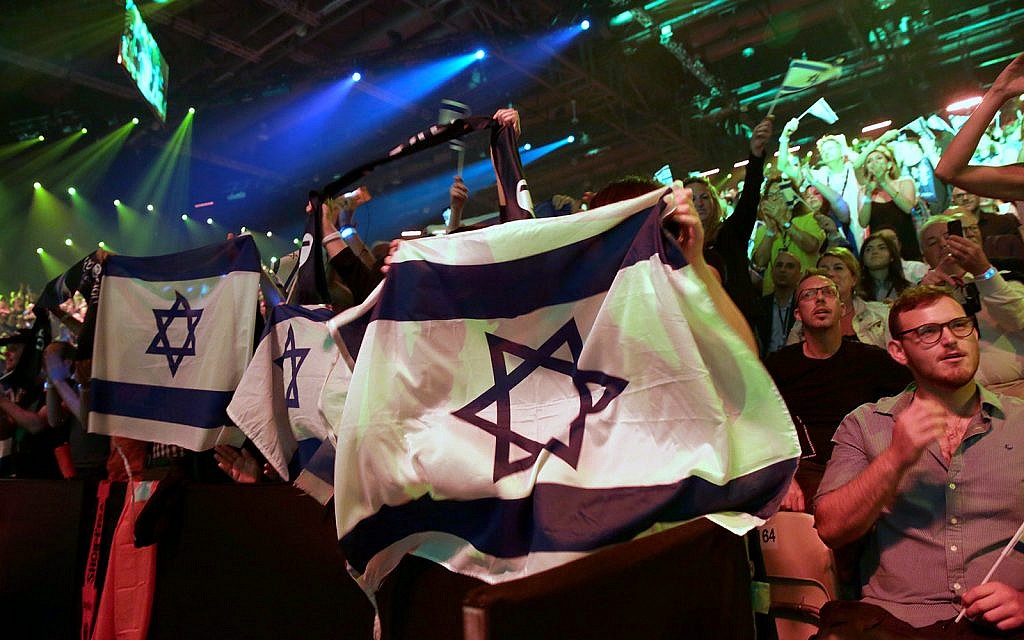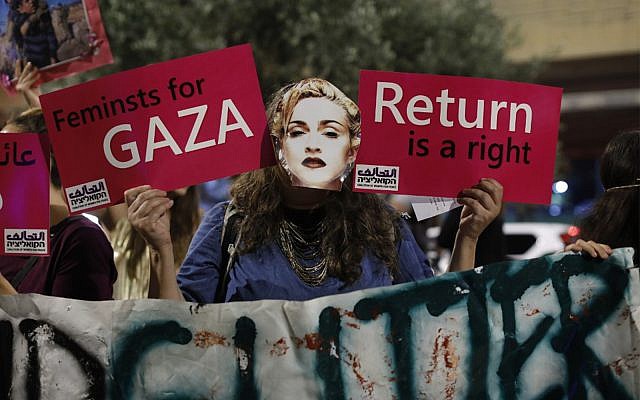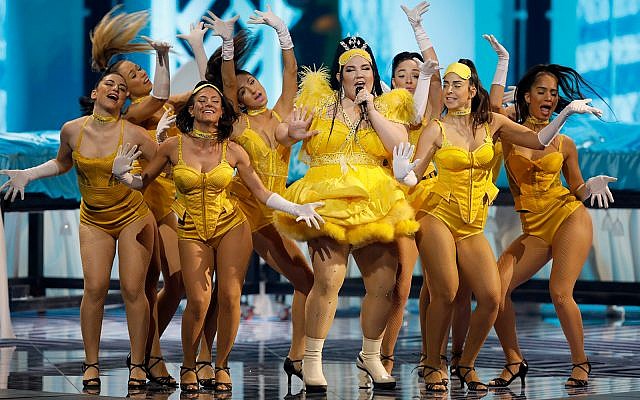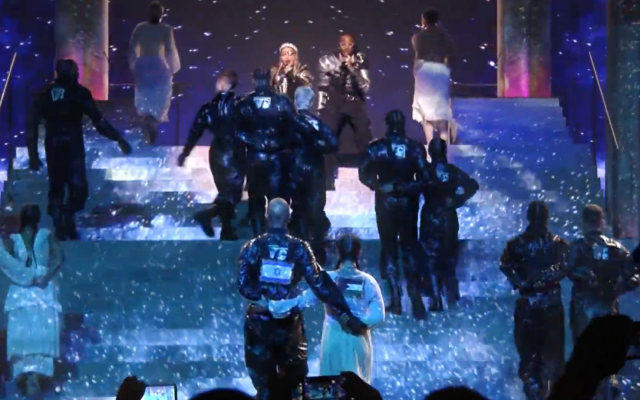As expected, Netherlands wins contest and hometown crooner Kobi Marimi finishes close to last, but fears of pro-Palestinian protests taking over fail to materialize

Tel Aviv hosted the Eurovision Song Contest for the first time in decades Saturday, pulling off one of the largest international events the country has ever hosted. The tightly organized production brought worldwide attention to Israel and managed to stay on message despite fears it would become politicized.
A full house of 7,300 people packed into the Expo Tel Aviv convention center to watch 26 acts from across the Continent and elsewhere, with some 70,000 more fans watching at the Eurovision Village across town. An estimated 200 million viewers around the world tuned in for the annual song contest, known for being equal parts kitsch and national patriotism
The Netherlands’ heavily favored Duncan Laurence won the contest with his soulful ballad “Arcade,” bringing the trophy to the country for the first time since 1975.
Israel’s Kobi Marimi finished in 23rd place, with his melancholy operatic “Home” failing to win over the jurors or voting public, but giving the hometown crowd something to cheer for a year after Netta Barzilai secured Israel’s fourth Eurovision win with the female empowerment pop hit “Toy.”
“This is to dreaming big. This is to music first, always,” Laurence said, as Barzilai handed him the trophy.
“This element of the performance was not cleared with the EBU and the Host Broadcaster, KAN. The Eurovision Song Contest is a non-political event and Madonna had been made aware of this,” the EBU said, according to Reuters.
Politics had dogged the contest almost immediately after Barzilai held the trophy aloft in Lisbon on May 13, 2018, and crowed, “Next year in Jerusalem.”
While some government ministers had insisted the contest be held in the conservative city, which has hosted it twice before, organizers in the end opted for freewheeling Tel Aviv. While the EBU said the decision was made solely based on Tel Aviv’s bid, there had been concerns that countries could refuse to participate in Jerusalem, or that Israel would use the contest as a tool to sell its hold over the city, part of which is also claimed by the Palestinians.

Excitement in Tel Aviv for hosting the contest had run high, with a week of events preceding the grand finale and some 500,000 people attending the Eurovison Village, which featured concerts and other entertainment related to the song contest.
The event itself was hosted by a quartet of Israeli celebrities, including top model Bar Refaeli. Israel’s own Wonder Woman Gal Gadot also made a cameo video appearance.
The contest, which was first held in 1957 and which Israel has participated in since 1973, is known for campy and over the top displays. This year, that included a heavy dose of pyrotechnics, an Australian act that featured singer Kate Miller-Heidke and two backup singers swaying dozens of feet over the stage on stilts and other spectacles, all of which seemed to go off without any major hitches.
Also performing were a slew of former winners and runners up, including Barzilai and 1998 winner Dana International. Gali Atari sang her 1978 winning song “Hallelujah” with several former iconic performers.
Hallelujah indeed!@ConchitaWurst@MansZelmerlow@Foureira_Eleni#DareToDream #Eurovision pic.twitter.com/PBpt9OKZmd
— Eurovision (@Eurovision) Mayo 18, 2019
Israel has won the Eurovision four previous times and it has provided the country with some of its cultural touchstones. “Hallelujah” became the country’s unofficial national song after it won the contest for Israel when it hosted the event, and Dana International became a national hero and global transgender icon when she won with “Diva.”
Barzilai became a role model for plus-size women after her win last year. She has been unapologetic about her weight, the loud colors she wears, and the funky chicken moves and sounds that have become her trademark.
To maximize onscreen tension, performers are ranked by a mix of fan votes and professional juries. Spectators could not vote for their own country, but like-minded nations tend to fall into blocs that back their regional favorites, with politics meshing into art.

Sweden’s soulful “Too Late for Love,” sung by John Lundvik, topped the professional jury vote and seemed to be on its way to carrying forward Sweden’s successful Eurovision track record 45 years after Swedish icons ABBA won with “Waterloo.”
As the reigning champion, Israel swept straight through to the finals — along with the five European countries that most heavily funded the event. The other 20 participants qualified through a pair of semifinal rounds.
Marimi, who became Israel’s entry after winning the “Rising Star” talent show but was seen as having little chance of winning, ended his rendition of “Home” by wiping tears from his eyes, and choked up as he tried to thank the crowd. Speaking to reporters later, he was upbeat despite the poor finish.
“I’m happy, it was really fun for me. I texted my family and told them to go home, that everything is good and they should not be worried,” he said. “We all cried, it was a roller coaster.”
As reported by The Times of Israel

